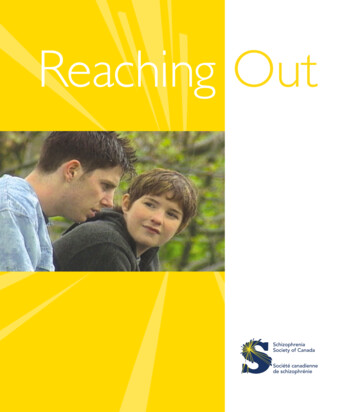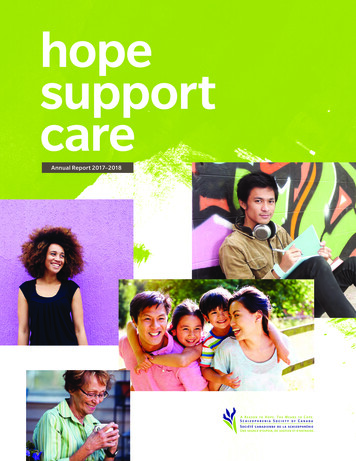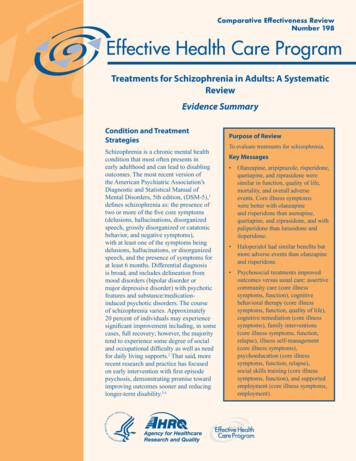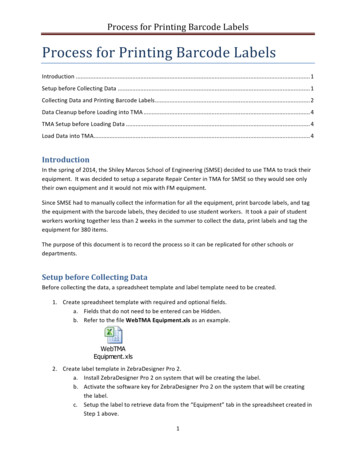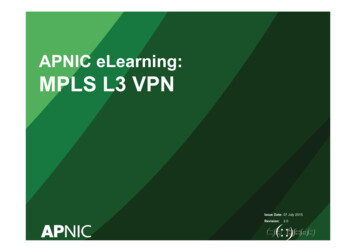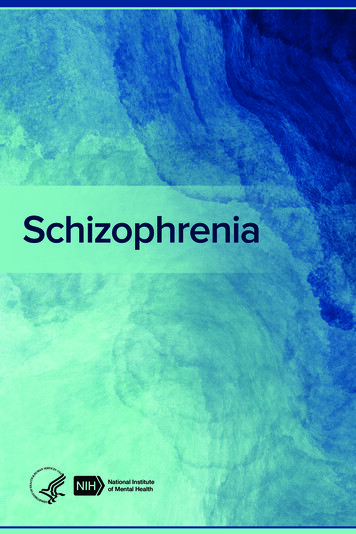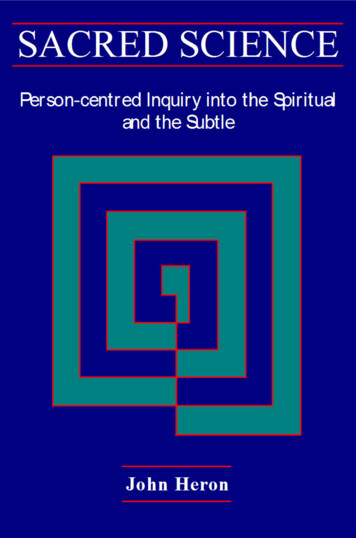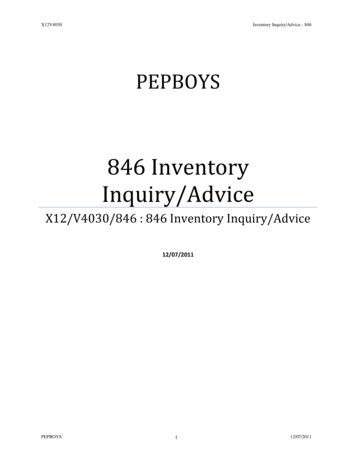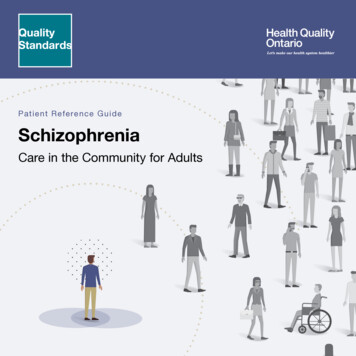
Transcription
Inquiry into the ‘Schizophrenia’ Label (ISL)----------------------------Many people are aware that ‘schizophrenia’ is a controversial diagnosis and its usefulness has beenquestioned from scientific, cultural, ethical and social perspectives. Western psychiatry has used it asa diagnostic label for 100 years. It is now being spread across the globe.Whatever the scientific and/or clinical usefulness of ‘schizophrenia’ as a medical diagnosis, we knowfrom several service user/survivor accounts that a diagnosis of ‘schizophrenia’ (or ‘psychosis’) hasserious social implications and consequences for people given the label. This is why we areundertaking this inquiry.We are aware of the ‘Schizophrenia Commission’, the terms of reference of which assumes that‘schizophrenia’ is a valid diagnosis and so considers ‘schizophrenia’ from a medical and psychiatricsystem perspective. Our Inquiry takes a service-user/survivor perspective and focuses on theexperience of people given the label and especially the consequences of this.ISL will consult with and collect evidence from: people affected by the label ‘schizophrenia’ (or similar labels such as ‘psychosis’), includingthose who use /have used mental health services, their families, carers and friends those who use these labels to describe mental health problems in other people, and those who have concerns about the use of such labels.The evidence will be examined by an independent Inquiry Panel. The Panel will produce a report andrecommendations and make these accessible in full and summary form online. Findings will bepresented to professional, statutory and voluntary sector bodies such as the Department of Health,the Royal College of Psychiatrists, the National Institute for Health and Clinical Excellence (NICE) andmental health charities. Publicity will be sought through press, television and radio. Funding will besought to continue and build on the work.So far, we have support from the following organisations:The Afiya TrustA national charity that works to reduce inequalities in health and social care provision for people from racialisedcommunities in the UK.Asylum Collective and MagazineAn international group of people committed to democratic psychiatry.Catch-a-FiyaNational black and minority ethnic mental health service user networkLaunchpadA mental health service user organisation in Newcastle-upon-TyneMaan Somali Mental Health, SheffieldA community based charity supporting the Somali community and helping NHS and Social Services deliver culturallysensitive servicesMindFreedom InternationalIndependent activist coalition united to win human rights and alternatives in mental health1
National Survivor User Network (NSUN)UK network of survivors and users of mental health services.NEt (North East together)A network of service users/survivors covering the whole of the North East EnglandNorthumberland, Tyne and Wear Service User and Carer Network (NTWSU&C)Rights and Wellbeing of Racialised Groups (RawOrg)A black and minority ethnic (BME) think-tank on mental health and mental health services in UK.Role NetworkA group of service users, survivors and carers covering the North West of EnglandShaping Our Lives National User NetworkAn independent user-controlled organisation, think tank and networkSharing Voices BradfordA community development mental health organisation that works within the inner city areas of Bradford.Soteria Network UKAn international movement of service users, survivors, activists, carers and professionals fighting for more humane, noncoercive mental health services.World Network of Users and Survivors of Psychiatry (WNUSP)A network with branches around the world.And Individuals:Carolyn AndersonVice Chair, National Survivor User NetworkMarian BarnesProfessor of Social Policy, University of Brighton. Formerly a Mental Health Act CommissionerRichard BentallProfessor of clinical psychology, University of LiverpoolPeter Beresford OBEChair, Shapin e the guidance on the ‘treatment’ of people given thelabel ‘schizophrenia’, or the more general one ‘psychosis’, issued by NICE and other bodies.Not investigate individual cases or complaints voiced during the inquiry.Coordinating groupJan WallcraftJan Wallcraft is a freelance researcher whose work is informed by experience as a mental healthservice user and activist. She has worked in service user involvement for a range of NGOs. She has aPhD from South Bank University London examining narratives of first experiences with psychiatrichospitalisation. Currently she is a Fellow of Birmingham and Hertfordshire universities, and isengaged in evaluation work on two different self-management programmes for people with longterm mental health problems. Her publications include On Our Own Terms, a report about theservice user/survivor movement, Healing Minds, a report on complementary and alternativetherapies in mental health, and the Handbook of Service User Involvement in Mental HealthResearch.Philip ThomasPhilip worked for over twenty years as a consultant psychiatrist in Manchester, North Wales andBradford. Philip has always held the strong belief that we can understand distress if we take intoaccount culture and history (both individual and group). In 1999, he became a founder member andco-chair of the Critical Psychiatry Network. Although he left clinical work eight years ago, Philipcontinues to write about critical psychiatry, madness and culture. Until recently, Philip was Chair of8
Sharing Voices Bradford, a community development project working with Bradford’s diversecommunities in the wide field of distress and madness.Jayasree KalathilJayasree is a researcher and writer. Having encountered psychiatric services in India and in the UK,and spent most of her adult life negotiating six different psychiatric diagnoses, Jayasree hasdeveloped a political identity as a survivor. She leads Survivor Research, a virtual collective ofindividuals interested in promoting user-led perspectives from marginalised communities in theunderstanding of mental health issues. Jayasree’s publications include Dancing to our own tunes,which explores black service user involvement, the black women’s narratives report Recovery andResilience, and the children’s book The Sackcloth Man. Jayasree is currently a co-chair of the SocialPerspectives Network and the editor of Open Mind.Suman FernandoSuman has been advocating for better services for black and minority ethnic people and for reformof the psychiatric system for many years. He was a psychiatrist in Enfield for over twenty years andthen later became an academic. Now he is honorary professor in the Faculty of Social Sciences andHumanities, London Metropolitan University. Also, he was a member of the Mental Health ActCommission 1988 – 1995. He has written several books in racism, and ‘race’ and culture issues inmental health and psychiatry.Inquiry PanelAn independent panel of experts will examine the evidence give to this Inquiry. The panel members: Are not involved in active psychiatric research into the use of medication for treatment of‘mental illness’ (because this inevitably involves using labels) Are not working in clinical psychiatry units (and so not subject to pressures and /or conflictof interests) Are residents of the UK Do not have personal or professional connections with the pharmaceutical industryColin King - ChairColin was given a diagnosis of ‘schizophrenia’ and medicated while still in his teens but survived thatexperience to go on to do social work training and become an Approved Social Worker. He did a PhDand was part of a team that co-authored a report called ‘Race, Values and Models’ for the MentalHealth Foundation. Having left social work practice, Colin is now writing a book (on ‘schizophrenia’)and teaches social workers at Lambeth College in Clapham.Ann DaviesA trained psychiatric social worker, Ann has taught mental health professionals in the UK and Europefor many years and has researched and published with survivors and users of mental health serviceson issues of common concern. As Director of the Centre of Excellence in Interdisciplinary MentalHealth (CEIMH) at the University of Birmingham, Ann supported the development of survivorgenerated resources for mental health professional and academic education. She is now EmeritusProfessor of Social Work and Mental Health at the University of Birmingham and an Academician ofthe Academy of Social Sciences. She is an active member of Suresearch a network in the Midlands ofmental health survivors/service users and their allies.9
Chinyere InyamaA solicitor who has been involved for many years in representing people appealing againstsectioning, Chinyere was appointed by the Law Society as an assessor of specialist mental healthlawyers and later became a Chairman of Mental Health Review Tribunals. He was a member of theMental Health Act Commission for several years and involved with many others in lobbying againstthe changes to the Mental Health Act implemented in 2007. Chinyere has written on race relations,mental health and human rights. He is the first black person to be appointed as a coroner and nowworks as Coroner at Walthamstow Coroners Court.Dominic Makuvachuma-WalkerHaving survived a racially motivated arson attack and subsequent psychiatric incarceration, Dominicbecame a campaigner for the rights of black people caught up in the mental health system. For over15 years, he has brought his personal experience of being a psychiatric survivor and his passion forsocial justice into his work in survivor activism, including managing the national black and minorityethnic mental health service user network, Catch-a-Fiya. Dominic is currently Vice-Chair of theNational Survivor User Network.David PilgrimDavid is both a clinical psychologist and sociologist with an interest in mental health policy and thephilosophy of mental health and ‘disorder’. He has worked in acute psychiatric units and beeninvolved in teaching psychologists, social workers and psychiatrists. He left the NHS in 2007 tobecome an academic and is now Professor of Mental Health Policy at the University of CentralLancashire and Honorary Professor of Clinical Psychology at the University of Liverpool. David’scurrent research interest is in the notion of recovery and the implications for service users of therecently revised mental health act. David has written many article and several books in the field ofsociology and illness.Premila TrivediSurvivor campaigner and writer. (Blurb to come)Work PlanThe inquiry will offer several different methods for people to contribute evidence:· An online survey· A publicised call for written evidence· An opportunity for telephone interviews· A series of focus groups· An inquiry event to be organised in March 2011February–March 2012· Press launch with launch of website early February· Opening of Inquiry:o Online surveyo Focus groupso Telephone interviews10
·o Written submissions of evidenceEvent in late MarchApril 2012· Evidence collected together and assembled in a dossier· Inquiry panel consider evidence and invite further evidence as necessary· Inquiry panel helped by co-ordinating committee draw conclusions and makerecommendationsMay 2012· Writing report on the evidence and the Inquiry panel’s conclusionsJune 2012· Launch of reportFundingThe Inquiry into the ‘Schizophrenia’ label has not received any resources from any funding agencies.The Inquiry Panel and the co-ordinating group are providing their services free of charge.The Inquiry is accepting donations from private individuals to meet the administration andoccasional expenses of the project. The fund will be held by NSUN and will be used to reimburse theexpenses of people attending meetings and to cover the costs of any public meetings, the website,postage and stationery needed to collect testimony and publicise the Inquiry’s work.Estimated expenses (for which donations are being sought)· Preparation of website· Telephone· Stationery· Postage· Travel (e.g. focus groups, Inquiry team, presenters of evidence)· Refreshments: focus groups, meetings11
Inquiry into the 'Schizophrenia' Label (ISL) ----- Many people are aware that 'schizophrenia' is a controversial diagnosis and its usefulness has been questioned from scientific, cultural, ethical and social perspectives. Western psychiatry has used it as a diagnostic label for 100 years.


